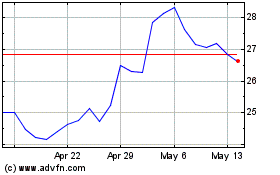By Sara Schonhardt
JAKARTA--When Newmont Mining Corp. began exploring for gold in
Indonesia in the 1980s, the country's wealth of untapped resources
was seen as the Colorado-based miner's ticket to the big
leagues.
The Batu Hijau copper and gold mine in eastern Indonesia was one
of the largest undeveloped deposits in the world, and Newmont's
billion-dollar investment put it on the path to becoming the
world's No. 2 gold miner by output.
More than three decades later, Newmont's exit from Indonesia
illustrates that the country has become a more difficult place for
foreign miners to operate, say analysts. Newmont in June agreed to
sell its 48.5% economic interest in the local unit that runs the
mine, PT Newmont Nusa Tenggara , to a group of local investors led
by Indonesian-listed oil-and-gas company PT Medco Energi
Internasional Tbk. Japan's Sumitomo Corp., with which Newmont
operates the mine, is selling its stake to the group as well.
This came a few weeks after BHP Billiton's sale of its coal
interests in Indonesia to a unit of local energy group PT Adaro
Energy Tbk.
Heavier regulation was a factor in the decision to leave,
Newmont Chief Executive Gary Goldberg told The Wall Street Journal
earlier this month.
In recent years Indonesia has required foreign miners to
gradually reduce their stakes to less than half, raised the taxes
and royalties they pay and mandated they process ore
locally--requiring a major investment in smelters at a time when
commodity-price uncertainty has miners around the world tightening
their belts.
Newmont has had "good success" with the Batu Hijau deposit over
the years, Mr. Goldberg said, but the company had an investment
decision to make: The next phase of mining would require an
additional $2 billion over the next five years, he said, and
company executives were concerned about how long it would take to
get a return.
Newmont, which has mines across the globe including in the U.S.,
Australia, Ghana and Peru, has spent the past few years overhauling
its business--cutting production costs, buying and selling mines
and paying down debt, which at roughly $2.7 billion is about half
what it was three years ago.
During a conference call to discuss the sale, Mr. Goldberg said
the company is consolidating assets around high-margin projects in
lower-risk areas and turning its focus back to gold.
A Sumitomo spokesman cited concerns in Indonesia including
"changes in regulations or laws, restrictions to foreign investment
and weak rupiah currency." It agreed to sell along with Newmont "to
maximize the asset value of Batu Hijau," the spokesman said, adding
that the "Indonesian market is still promising and we continue to
expand our business field there."
Vast deposits of copper, nickel and coal have drawn foreign
miners to Indonesia for decades, and mining has contributed greatly
to the country's economic growth. But growing nationalism, policy
uncertainty and some officials' desire for the state to take
control of natural resources has raised risks for foreign miners,
analysts say.
By law, miners are required to eventually shift from long-term
contracts of work to a licensing system in which they say their
rights are more limited. Analysts say the rules have made Indonesia
an increasingly difficult place to do business and have deterred
exploration investment.
"Major multinational mining companies increasingly just see
Indonesia as too hard for them," said Bill Sullivan, a
Jakarta-based legal adviser to mining-related companies.
Earlier this year, mining giant BHP Billiton Ltd. said it agreed
to sell its 75% interest in IndoMet Coal to PT Alam Tri Abadi to
pursue other options that BHP said were more attractive for future
investment.
The government says foreign miners are still willing to invest
in Indonesia. Bambang Gatot Ariyono, director-general of minerals
and coal at the energy ministry, said several companies have signed
amended contracts, and the government is working with miners to
revise and clarify rules.
A spokeswoman for Medco said that as a domestic company it sees
long-term value in investing in Indonesia and is confident it will
secure the licenses needed to keep the mine operating.
Some major miners, such as U.S. gold and copper producer
Freeport McMoRan, are sitting on resources too valuable to abandon,
say industry players. A spokesman for PT Freeport Indonesia said
that the company intends to continue to cooperate with the
government.
However, many smaller miners have suspended operations and some
large-scale operations have reduced mining activities and exports
due to uncertainty over contract extensions, say analysts.
Indonesia's ban on the export of unrefined ores--meant to
increase the value of the country's exports--hit some companies
particularly hard. To receive an export permit, companies had to
demonstrate progress on refining. After the ban took effect in
2014, Newmont's local unit ceased exports for more than eight
months and declared force majeure on existing contracts.
Newmont's exit sends a signal to other miners that Indonesian
mining projects are no longer competitive, said Ian Wollff, a
longtime geologist and independent consultant to the mining
industry. "They [Newmont] are saying...'We've got money, but why
should we spend it there? Maybe we're better off spending it
somewhere else.'"
Rhiannon Hoyle in Sydney contributed to this article.
Write to Sara Schonhardt at Sara.Schonhardt@wsj.com
(END) Dow Jones Newswires
August 30, 2016 08:18 ET (12:18 GMT)
Copyright (c) 2016 Dow Jones & Company, Inc.
Sumitomo (PK) (USOTC:SSUMY)
Historical Stock Chart
From Mar 2024 to Apr 2024

Sumitomo (PK) (USOTC:SSUMY)
Historical Stock Chart
From Apr 2023 to Apr 2024
